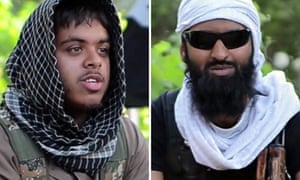
Britain’s envoy to the United Nations has provided a further legal justification for the RAF killing of Islamic State fighters in Syria, declaring that it was on behalf of the “collective self-defence of Iraq”.
The new explanation, which was not disclosed to MPs at Westminster immediately after David Cameron told parliament about the killings, is contained in the text of a letter sent by Matthew Rycroft, the UK’s permanent representative to the UN in New York.
The letter dated 7 September but made public for the first time on Thursday was obtained by the London-based human rights group Reprieve, which has questioned the legality of the drone strike on 21 August that killed two British jihadis, Reyaad Khan and Ruhul Amin, in the Syrian city of Raqqa.
The letter cites the justification given by Downing Street for the killing, referring to Article 51 of the UN charter: “This airstrike was a necessary and proportionate exercise of the individual right of self-defence of the United Kingdom.”
Rycroft’s letter goes on to state: “As reported in our letter of 25 November 2014, Isil [Isis] is engaged in an ongoing armed attack against Iraq, and therefore action against Isil in Syria is lawful in the collective self-defence of Iraq.”
Human rights groups said that providing two alternative legal arguments as cover for military action against Isis fighters in Syria implies a lack of self-confidence among British officials. The United Nations, it was claimed, might not be convinced that an attack on the UK, supposedly organised by Reyaad Khan, had been imminent, and the additional justification had therefore been added.
Jennifer Gibson, a lawyer at the UK civil rights group Reprieve, said: “David Cameron needs urgently to answer questions about whether there was genuinely an imminent threat to the UK or is this an expansion of the war against Isis without parliamentary approval? This argument was never raised in parliament. It can’t be both explanations.”
Parliament has voted to allow UK forces to operate in Iraq against Isis in support of the Baghdad government. However, MPs have not been asked to vote on whether attacks on Isis forces should be expanded to Syria.
Philippe Sands QC, professor of international law at University College London, said: “The wording of the [Rycroft] letter is ambiguous but it appears to posit two alternative justifications. The first is the self-defence of the United Kingdom, the second is collective self-defence in support of Iraq. The latter is an entirely different justification as a legal matter [for carrying out attacks in Syria].”
Jeremy Corbyn, the leading contender for the Labour leadership, also criticised David Cameron over the Syrian airstrike, saying that he would not have authorised it.
Speaking on ITV News, Corbyn said: “The PM has some very difficult questions to answer about the legality of what he did. I’m unclear as to the point of killing the individual [Reyaad Khan] by this drone attack.”
Rycroft’s personal involvement will also raise eyebrows. He was Tony Blair’s private secretary at the time of the 2003 invasion of Iraq.
His name was on a key memo revealing that Britain and the US were planning five months before the invasion to take action against Saddam Hussein without a second UN resolution.
By coincidence, Iain Macleod, legal adviser at the Foreign Office, was also legal counsellor at the UK mission to the UN in New York in the run up to the Iraq invasion.




No comments:
Post a Comment